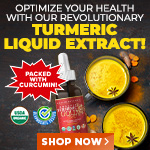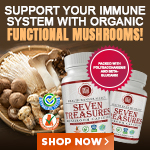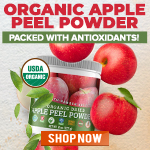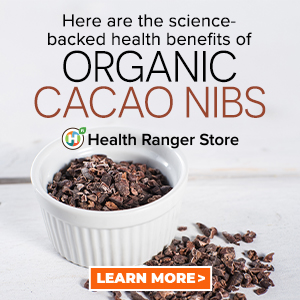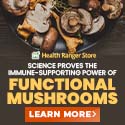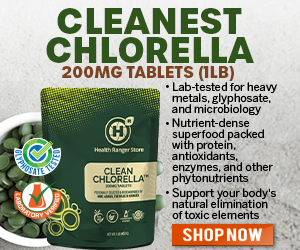
Are the coral calcium claims by Bob Barefoot credible and believable?
 Monday, June 06, 2005 Monday, June 06, 2005by Mike Adams, the Health Ranger Editor of NaturalNews.com (See all articles...) Tags: coral calcium, calcium supplements, nutrition |
- Solar storm sparks concern as supervolcano nears eruption: Could sun's electromagnetic pulse trigger cataclysm?
- ANOTHER Clinton associate, who vowed to expose elite pedophile ring, found dead
- Mysterious hexagonal UFO sighting over California sparks questions amid government secrecy
- “Cancer-Free with Food”: A culinary revolution in the fight against disease
- CDC's dangerous gamble: Pregnant women and their unborn babies at put at unreasonable RISK from SIX toxic vaccines
- Stacey Grosh’s essential guide to DMSO for relief, healing and recovery
- EXPENSIVE CANCER THERAPY promoted in New Zealand while ignoring the very CAUSE of their shockingly high rate of lymphoma cases
- Consumer Reports finds high levels of LEAD in cassava products
- L.A. edges closer to historic $30 minimum wage for tourism workers amid backlash
- Forever chemicals” invade Australian water supply: Investigation yields torrent of carcinogens, signifying vast regulatory failure
- Florida bans toxic fluoride in tap water, protecting citizens from forced medication
- Peanut oil: A superfood source of healthy fats to support your heart
- Mexican and Canadian truckers illegally dominate U.S. highways
- Study: Teens with mental health issues spend more time on social media, making things worse
- Trump administration probes publisher of influential COVID origins paper over alleged Fauci influence
- Victory for health freedom: HHS drops COVID-19 vaccine mandates for children and pregnant women
- Former FBI director's cryptic beach post and family's legal actions stoke political firestorm
- U.K. study finds omega-3s shape kinder, smarter kids
- Canada's COVID cover-up: Health officials swore secrecy to protect Trudeau from vaccine scandal
- WAR ON COGNITION: The Coordinated Assault on Your Brain and How to Defend Yourself Against Every Attack
- Singapore's draconian vaccine mandate: Citizens face jail time for refusing FORCED medical procedures that do HARM
- Gene-edited pork sneaks onto your plate: FDA quietly approves CRISPR pigs amid health and ethical concerns
- Big Pharma's Dirty Secret: How Prescription Drugs Are Starving Your Body of Essential Nutrients
- Hidden poison in your medicine and supplements: How phthalates in capsules are silently attacking your heart, thyroid, and hormones
- BBC accused of “political censorship” for shelving Gaza documentary amid mounting pressure
- Brushing with poison: Study finds toxic heavy metals in 90% of toothpaste brands, including those for children
- RED ALERT: Nuclear War Between India and Pakistan Could Trigger Global Catastrophe… full RISK ANALYSIS
- Australia’s vaccine cover-up: 35 died same day as COVID shot, but authorities ignored them
- JESUS NEVER SPOKE ENGLISH: Historical facts on why the Bible you’re probably reading has been altered, redacted or hidden from much of its original meaning
- Why All Government Officials and Big Tech CEOs Who Engage in Systematic Viewpoint Censorship Must Be ARRESTED, Prosecuted, and Sentenced to Life in Prison
- Solar storm sparks concern as supervolcano nears eruption: Could sun's electromagnetic pulse trigger cataclysm?
- Survival basics: 5 Dangerous locations to avoid during an EMP attack
- X-class solar flare sparks worldwide disruptions, with more storms expected as sunspot turns toward Earth
- DOJ targets controversial “Proximal Origin” study in push for scientific transparency
- EU court exposes secret Pfizer deal, orders von der Leyen and Bourla to reveal concealed texts
- The truth about Benzyl Alcohol in beauty products
- The Miraculous Healing Power of DMSO: Nature's Forgotten Cure for Cancer, Pain, and Regeneration
- Biblical truth: God will carry out a “cosmic reset” of Earth and destroy all human civilization with a series of extinction-level cosmic impacts known as The Seven Trumpets, Seven Bowls and Seven Seals
- URGENT REPORT: The China Import Embargo - What to Stockpile Now Before America Runs Out
- The Ultimate Survival Guide to Baking Soda: A Miraculous, Multi-Purpose Remedy for Health, Home, and Emergency Preparedness
- A call to preserve America’s future: “Defeating Big Government Socialism” by Newt Gingrich
- Stunning Visualization of the Seven Trumpets in the Book of Revelation
- Big Pharma launches “Vaccine Integrity Project” to combat Secretary Kennedy and keep 94 shots going into kids with mandates and liability protections
- World Economic Forum's current downfall exposes legacy of totalitarianism, financial fraud, and crimes against humanity
- Biden regime deployed over 600 grants to fund disinformation agenda, to silence the truth and stifle debate
- The Miraculous Healing Power of Green Tea: Unlocking the Potent Antioxidants That Big Pharma Doesn't Want You to Know About
- The unspoken truth about chemotherapy: These “treatments” create toxic time bombs in your body called CELL-KILLING PARTICLES
- U.S. Government's Bio-War Against America: 15 Historical Medical Horrors Inflicted on the American People by the Government Itself
- A win for free speech: State Department SHUTS DOWN controversial disinformation office
- Widespread social and economic unrest: Steve Quayle issues urgent financial warning of imminent asset collapse in new interview with Mike Adams
- French rioting demonstrates how gun control laws are failing law-abiding citizens
- Head of L.A. Port warns of incoming plunge in U.S. supply chain, empty shelves and inventory depletion in 5-7 weeks
- Supreme Court to review challenge to Illinois’ semi-automatic gun ban
- Singapore's draconian vaccine mandate: Citizens face jail time for refusing FORCED medical procedures that do HARM
- Red Cross issues warning to stop blood plasma donations from vaccinated people
- Scientists confirm: GENIUS brain function can be spontaneously unleashed in humans without any apparent cause
- EPA advisor admits the agency is funneling billions to climate groups ahead of Trump’s return to White House
- HYSSOP: What research reveals about the health benefits of this ancient holy herb
- Two containers with completed ballots fall out of truck in Florida
- Newly released JFK files reveal Pentagon's role in creating Lyme disease and covid in the same lab
- Mike Adams releases country western hit single: Goin’ Back in Time is Comin’ Home
- Global leaders unite to clamp down on “misinformation” with UN-backed Cascais Declaration
- BREAKING: 2025 NDAA authorizes mandatory military draft of WOMEN across America… as Pentagon pursues global NUCLEAR war with both Russia and China at the same time
- I Want My Bailout Money – new song released by Mike Adams
- Michael Yon warns of a ZIONIST TAKEOVER in Trump’s second administration
- BOMBSHELL: DNA testing kits are a SCAM to develop ethnic-specific bioweapons
- Ozempic and Wegovy weight loss drugs are injectable LIZARD VENOM PEPTIDES that may unleash a devastating wave of organ failure… side effects align with symptoms of SNAKE BITES
- The Health Ranger releases “Vaccine Zombie” song and music video, using AI-animated zombies for the music video
- These 13 countries just signed an agreement to engineer a global FAMINE by destroying food supply
- Israeli soldiers accused of even more torture and abuse in the West Bank
- RFK Jr. clears key hurdle: Sen. Susan Collins backs controversial HHS nominee, signaling a new era for health policy
- Sermon 30: How Jesus reveals Caesar’s FAKE CURRENCY and FALSE AUTHORITY
Well, first off, I want to applaud you for remaining skeptical of the health claims described in the book, "The Calcium Factor," not because of whether or not they are true, but because the person authoring the book has a significant financial interest in your purchasing calcium.
As you know, I never have a financial interest in the products that I recommend or review on this website. And, I think it is a great conflict of interest for anyone to both write about a nutritional supplement and sell that same nutritional supplement. It doesn't mean that they're wrong. It just means that their information must be taken in context.
I encourage you and other readers to live day-to-day with that kind of skepticism. We should all be skeptics of people who are trying to sell us products, especially if it's drugs or herbs or vitamins, because anything can have an element of hype or exaggeration to it. Just because someone is offering something that seems to be a natural vitamin or mineral supplement doesn't mean it's not being over-hyped.
In fact, there are many hucksters and con artists in the nutritional supplement industry, just as there are in the pharmaceutical industry. So, my position has never been that all nutritional supplements are good and that all pharmaceuticals are bad. It's just that if you're looking for what's truly healthy you're only going to find them from the natural world and never from the world of manufactured, synthesized drugs.
The category of nutritional supplements is definitely where you're going to find those supplemental products that enhance health rather than harming your health in the way that patent medications do. But, getting back to the question of calcium and more specifically, coral calcium, the fact is that Bob Barefoot is very much right about almost everything he says about calcium, but only for those people who are calcium deficient. In other words, the healing powers of calcium are indeed miraculous if you don't have enough calcium, because calcium is so intimately involved in human physiology that a lack of calcium has terrible systemic effects.
Most people tend to think of calcium as only having one purpose, and that is supporting bone health. And certainly, calcium is critical for having good bone density, but calcium is also critical for your nervous system and nerve function, which makes it essential for cardiovascular health. In other words, if you don't have enough calcium, your heart cannot contract in the way it is supposed to. Your brain will not function in as healthy a manner as it could if you had plenty of calcium. Your acid-alkaline balance may be disrupted without calcium. Your immune system function may be off. And certainly, your skeletal system is going to be affected, as well.
There are many systems in the body that need calcium. And, to a person who is calcium deficient, the addition of supplementary calcium can indeed seem quite miraculous. So, there's nothing incorrect about stating that calcium is a miraculous supplement. In fact, I think the human body is a living, breathing miracle all by itself. And the way that nature works is a miracle. So, there is nothing incorrect about using the term "miraculous" to describe the healing effects of some nutritional supplements.
The question becomes: How many people are calcium deficient? That is truly the relevant question in here, because if most of the population had sufficient quantities of calcium, then the claims made by Bob Barefoot on the benefits of calcium might be considered to be exaggerated. On the other hand, if the population were largely calcium deficient, then the claims describing the health benefits of calcium would have much broader application, and would be considered far more accurate.
So again, the question comes down to: "What is the incidence of calcium deficiency in the population?" And, this is where you're going to find tremendous disagreement depending on who you talk to. In my own opinion, calcium deficiency is chronic and widespread. I think most Americans and most people in the civilized world who consume processed foods or manufactured foods do exhibit a calcium deficiency.
But, understand that conventionally trained doctors, physicians and even dieticians would strongly disagree with that, because they're going off of Recommended Daily Allowance (RDA) numbers. And, they're saying that if a person meets the recommended daily allowance (RDA) requirements for vitamins and minerals, then that's really all they need. In contrast, most nutritionists and people from the wellness world would say that the USRDA numbers are really just the minimum requirements needed to avoid nutritional deficiencies that cause diseases. They are not in any way descriptive of the optimum levels of nutrition for a human being.
Essentially, the whole argument about the benefits of calcium comes down to your position on the RDA numbers, or in other words, what you think is the recommended daily allowance or requirement of calcium in an adult human being. My own position, as I've stated, is that most of the population is chronically deficient in calcium.
It's difficult to get sufficient calcium from a balanced diet
There are quite a few other related issues to this question beyond just whether or not Bob Barefoot is telling the truth about coral calcium. The biggest question, I think, is "Can people get sufficient quantities of usable calcium from the typical diet?" Now this is a favorite myth of conventional medicine, which is to say that all you need to have adequate nutrition is to eat three balanced meals a day, and you'll get all the vitamins and minerals you need. You don't need any supplementation whatsoever.That's a common myth promoted by people in conventional medicine who really don't have the education or the understanding in nutrition that we would now consider to be authoritative. There have been significant advances in the understanding of nutrition over the last couple of decades. And yet, medical schools are still teaching nutrition as it was taught in the 1960s.
So, conventionally trained medical professionals are not going to understand this point, and most likely, they're going to argue with you if you present them with this information because they're not only wrong, but they also operate under the misimpression that they are right. The point I'm trying to make here is that based on my own calculations of the nutritional makeup of typical American food, the average person would have to consume 10,000 calories a day just to meet the minimum USRDA requirements for all the vitamins and minerals that are tracked by the USRDA chart.
10,000 calories a day is five times the food intake that an average adult human being should be consuming. In other words, you would have to eat ravenously -- you would have to engage in non-stop, belly-splitting consumption. You'd be chewing food constantly just to get the essential vitamins and minerals into your diet that you're supposed to get to avoid chronic disease.
And yet, at the same time, you'd be getting 10,000 calories, which is five times the calories you need, meaning that you'd be packing on pounds at the rate of around two pounds of body fat per day.
So, obviously this is not a strategy for being healthy. Yes, you would get all the vitamins and minerals you need, but you'd be spending five times as much on food and you'd be adding two pounds of body fat a day, unless you were engaged in some superhuman cardiovascular exercise program. Remember, even a guy like Lance Armstrong only burns about 5000 calories a day during the competition. So, to burn 10,000 calories a day is virtually impossible.
Supplementation is the answer for nutrition
What does this all mean? It means you have to supplement if you're going to be healthy, and meet the minimum requirements for vitamins and minerals. So, what I'm saying is that the average American must take nutritional supplements if they want to prevent chronic disease, or even meet the basic minimum requirements for nutrient intake.If you want to exceed those requirements and actually have superior health (that is health that goes beyond just preventing disease and actually taps into the mental and physical performance potential of the human being), then you will need to supplement at very high levels. You would need to supplement with superfoods or whole food supplements. And, the person asking this question mentioned Juice Plus or the Alive food supplements. These are excellent supplements.
Don't get your calcium from cows
But, specifically, when it comes to calcium, you need to supplement it if you're going to get adequate supplies of calcium in your system. And, here is where most people go wrong. They think the best source of calcium is cows' milk. Why do they think that? Because that's the message that the dairy industry has spent hundreds of millions of dollars over many, many years to inject into peoples' minds. The public relations efforts and the advertising has paid off, people now mistakenly believe that cows' milk is a great source of calcium.Well, it simply isn't a great source of calcium. In fact, it's not even what I would consider a mediocre source of calcium. Why is that? First off, note that spirulina has far more calcium than milk on an ounce per ounce basis. So, if you really want to get some calcium into your system, supplement with spirulina. Remember, spirulina is harvested from the ocean. It has absorbed not only the macro minerals like calcium and magnesium, but also the trace minerals from the ocean waters. When you consume spirulina, you are automatically getting these minerals in a highly bio-available form.
Other good sources of calcium include green, leafy vegetable like spinach. The darker the vegetable, the more calcium it contains, generally speaking. So, if you want to get a lot of calcium into your diet, you can also consume increasing quantities of these green, leafy vegetables. That would include spinach, kale, broccoli, and of course, all of the popular salad greens, the darker the better.
What about coral calcium? As one reader pointed out to me in an email, coral calcium is essentially ground up limestone powder. And, I tend to agree with that assessment. It's not calcium in a plant form. But the advantage of coral calcium over, say, cave limestone from caves in Missouri, is that the coral calcium also has the spectrum of minerals found in the ocean. In other words, you're getting more than just calcium and you're also getting trace minerals.
Unfortunately, coral calcium isn't very high in the other macro minerals, such as magnesium and zinc, but it is high in trace minerals. So, it's a great source of what I call inorganic calcium. You can also go the more expensive route and buy chelated calcium supplements from a variety of vitamin manufacturers like Twin Lab. Chelated calcium is yet more bio-available. It is more effective per ounce than other forms of calcium. But, is it more effective per dollar than other forms of calcium? I haven't done that assessment myself, but my guess is that it's both pricey and effective, meaning that you may be just as well off to spend your money on cheaper sources of calcium that have lower bio-availability, because you can afford to put more of that powder into your body.
Speaking of pricing, if you really want to get a good buy on coral calcium, you need to check out my book called "Secret Sources for Health Products" or what I just call 'Secret Sources.' In this book, which is currently offered free of charge to new subscribers, I reveal a fantastic source for buying coral calcium in bulk. It's essentially the same nutritional makeup as any other coral calcium, but it's a fraction of the price you might typically pay if you're buying brand name coral calcium from a health food store.
Other problems with milk from cows
Getting back to cows' milk, by the way, another reason I don't think cows' milk is a very good source of calcium is because it lacks magnesium, and it typically lacks vitamin D even if it says it has vitamin D on the bottle, because the vitamin D is destroyed by light. So, when you have the milk sitting there in the store, and it's being bombarded by photons from the fluorescent lighting in the store, the vitamin D is being quite rapidly destroyed. By the time you drink it, you're not getting really much vitamin D at all.You'll get a lot more vitamin D by just walking outside and getting some natural sunshine on your skin, which is of course the preferred way to get vitamin D in the first place. You don't need to be drinking vitamin D if you have the sun. Just go out and get some sun and let your body create it for you. That's also a great way to save money on vitamin D supplements.
Another reason I don't like cows' milk as a source of calcium is because there is a lot of bad that goes in with the good of the calcium. You get the homogenized milk fats, which I call "processed milk fats." You will also get a whole lot of calories.
You know, milk, I think, is very deceptively marketed. When milk says 2 percent milk fat on the label, a lot of people are under the misimpression that from a calorie counting point of view, you only get 2 percent of your calories from fat when you're drinking a glass of milk. But that's not the case at all. If you actually do the math, you find that the fat provides 33 or 34 percent of the calories from drinking 2 percent milk.
So the fat is really a huge part of cows' milk. And it's not even healthy fat. It's saturated animal fat, the kind of fat that is widely known to promote cardiovascular disease, strokes and heart attacks. From a holistic and naturopathic point of view, saturated animal fats are known to stagnate the body, which means they can lead to constipation, chronic sinus infections, suppression of the immune system, inability of lymph to properly circulate, suppression of spleen function, and so on. So, there are many, many reasons not to be consuming cows' milk as a source of calcium.
Of course, the dairy industry doesn't want you to hear any of this. And probably, I'll get a threatening legal from them after this is published, challenging everything I've said here. But nevertheless, it's all quite true.
Wrapping this up, let me give you my experience with getting calcium into my body. What do I do for it? First of all, I do take coral calcium. I blend it in with my morning drink. If you've been reading this site for any period of time, you know that I have a morning drink, blended drink, where I combine rice protein, spirulina powder, superfood powder, soy milk, stevia, whole aloe vera leaf right out of my yard and a few other elements including coral calcium, and then drink that down as my breakfast.
But, I don't rely on coral calcium exclusively. I also consume a large amount of spirulina. It can be anywhere from 5 to 20 grams a day, depending on the day. I also tend to eat a lot of dark, leafy vegetables. I also consume a lot of nuts that have small amounts of calcium.
So I tend to get my calcium in a way that ancient humans got their calcium, which was by eating unprocessed foods in fairly large quantities, and getting those foods from their natural environments. So of course, I purchase organic foods whenever possible and I eat superfoods in fairly large quantities.
Always follow the money
But, one more thought to add to all of this, should you be skeptical of the information from people who are marketing the products covered by that information? Yes! Absolutely! You should always be skeptical. I hope that I'm reaching readers who are independent thinkers, who are intelligent, who are going to take every bit of information they come across and ask the sanity questions, which are: "Does this make sense? Is this information truly neutral? Is the party that's offering this information truly isolated from the financial repercussions of this information?"Often, when you're receiving information from conventional medical circles, a good question to ask is, "How does this information defend the belief systems of the people providing it?" Or, "How does it protect their career or their published papers or their medical practice?" These are important questions to ask. And, I'm really quite happy to hear readers who question the information they read on my site. I love to get emails from people that say, "Hey! I read your articles every day and I agree with 98 percent of it. But here is this other part over here that I'm not sure about."
I'm ecstatic when I read those kinds of emails because that means I'm reaching people who are thinking and deciding for themselves what to believe and what to integrate in their own lives. And, that's really the point here. It's not that everybody has to agree with me, or adopt a holistic, natural point of view for health. What I'm trying to do is get people to think about their health, think about true cause and effect, and to break through the distortions put forth by the pharmaceutical industry and by the Food and Drug Administration (FDA), who are quite obviously biased in what they promote and what they attempt to discredit.
If I can just help to raise awareness about the link between foods and chronic disease, then I've accomplished my mission. So, thank you for asking this question, and keep these great questions coming!
Coral calcium at FETCH.news
Get independent news alerts on natural cures, food lab tests, cannabis medicine, science, robotics, drones, privacy and more.
 About the author:Mike Adams (aka the "Health Ranger") is a best selling author (#1 best selling science book on Amazon.com) and a globally recognized scientific researcher in clean foods. He serves as the founding editor of NaturalNews.com and the lab science director of an internationally accredited (ISO 17025) analytical laboratory known as CWC Labs. There, he was awarded a Certificate of Excellence for achieving extremely high accuracy in the analysis of toxic elements in unknown water samples using ICP-MS instrumentation. Adams is also highly proficient in running liquid chromatography, ion chromatography and mass spectrometry time-of-flight analytical instrumentation.
About the author:Mike Adams (aka the "Health Ranger") is a best selling author (#1 best selling science book on Amazon.com) and a globally recognized scientific researcher in clean foods. He serves as the founding editor of NaturalNews.com and the lab science director of an internationally accredited (ISO 17025) analytical laboratory known as CWC Labs. There, he was awarded a Certificate of Excellence for achieving extremely high accuracy in the analysis of toxic elements in unknown water samples using ICP-MS instrumentation. Adams is also highly proficient in running liquid chromatography, ion chromatography and mass spectrometry time-of-flight analytical instrumentation.
Adams is a person of color whose ancestors include Africans and Native American Indians. He's also of Native American heritage, which he credits as inspiring his "Health Ranger" passion for protecting life and nature against the destruction caused by chemicals, heavy metals and other forms of pollution.
Adams is the founder and publisher of the open source science journal Natural Science Journal, the author of numerous peer-reviewed science papers published by the journal, and the author of the world's first book that published ICP-MS heavy metals analysis results for foods, dietary supplements, pet food, spices and fast food. The book is entitled Food Forensics and is published by BenBella Books.
In his laboratory research, Adams has made numerous food safety breakthroughs such as revealing rice protein products imported from Asia to be contaminated with toxic heavy metals like lead, cadmium and tungsten. Adams was the first food science researcher to document high levels of tungsten in superfoods. He also discovered over 11 ppm lead in imported mangosteen powder, and led an industry-wide voluntary agreement to limit heavy metals in rice protein products.
In addition to his lab work, Adams is also the (non-paid) executive director of the non-profit Consumer Wellness Center (CWC), an organization that redirects 100% of its donations receipts to grant programs that teach children and women how to grow their own food or vastly improve their nutrition. Through the non-profit CWC, Adams also launched Nutrition Rescue, a program that donates essential vitamins to people in need. Click here to see some of the CWC success stories.
With a background in science and software technology, Adams is the original founder of the email newsletter technology company known as Arial Software. Using his technical experience combined with his love for natural health, Adams developed and deployed the content management system currently driving NaturalNews.com. He also engineered the high-level statistical algorithms that power SCIENCE.naturalnews.com, a massive research resource featuring over 10 million scientific studies.
Adams is well known for his incredibly popular consumer activism video blowing the lid on fake blueberries used throughout the food supply. He has also exposed "strange fibers" found in Chicken McNuggets, fake academic credentials of so-called health "gurus," dangerous "detox" products imported as battery acid and sold for oral consumption, fake acai berry scams, the California raw milk raids, the vaccine research fraud revealed by industry whistleblowers and many other topics.
Adams has also helped defend the rights of home gardeners and protect the medical freedom rights of parents. Adams is widely recognized to have made a remarkable global impact on issues like GMOs, vaccines, nutrition therapies, human consciousness.
In addition to his activism, Adams is an accomplished musician who has released over a dozen popular songs covering a variety of activism topics.
Click here to read a more detailed bio on Mike Adams, the Health Ranger, at HealthRanger.com.
Take Action: Support Natural News by linking to this article from your website
Permalink to this article:
Embed article link: (copy HTML code below):
Reprinting this article:
Non-commercial use OK, cite NaturalNews.com with clickable link.
Follow Natural News on Facebook, Twitter, Google Plus, and Pinterest
Science News & Studies
Medicine News and Information
Food News & Studies
Health News & Studies
Herbs News & Information
Pollution News & Studies
Cancer News & Studies
Climate News & Studies
Survival News & Information
Gear News & Information
News covering technology, stocks, hackers, and more



"Big Tech and mainstream media are constantly trying to silence the independent voices that dare to bring you the truth about toxic food ingredients, dangerous medications and the failed, fraudulent science of the profit-driven medical establishment.
Email is one of the best ways to make sure you stay informed, without the censorship of the tech giants (Google, Apple, Facebook, Twitter, YouTube, etc.). Stay informed and you'll even likely learn information that may help save your own life."
–The Health Ranger, Mike Adams















